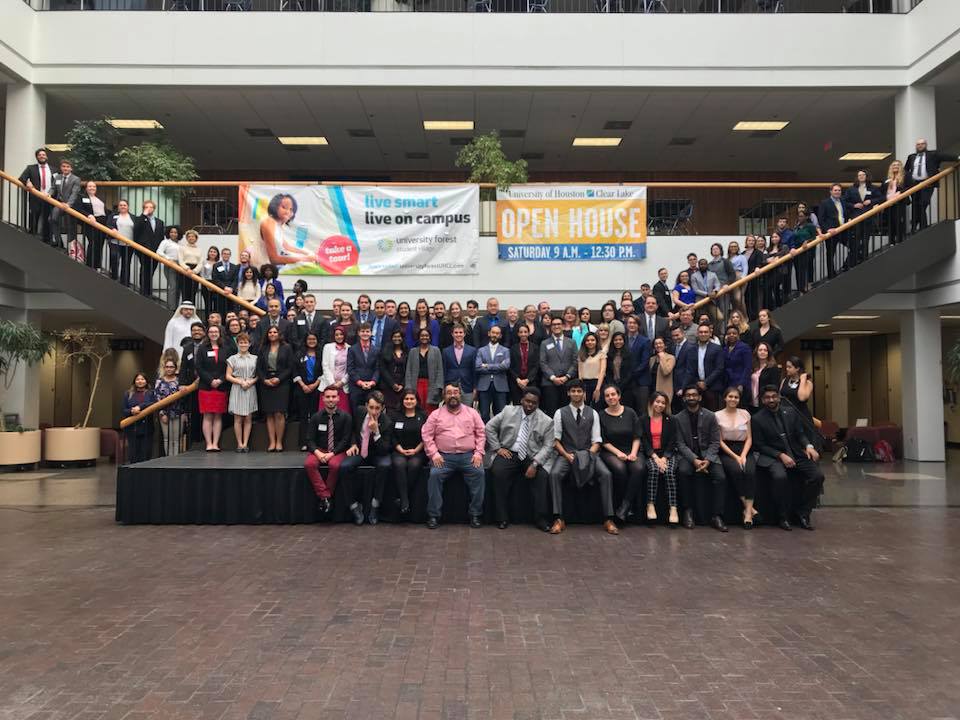Students solve world problems at Model Arab League Conference

UHCL hosted the Bilateral MAL Regionals for the second year in a row Feb. 16-18. The conference hosted numerous councils from universities across the state, giving each one the opportunity to study and represent a country from the Arab world.
The Model Arab League (MAL) is an organization that provides students with opportunities to test their diplomatic skills, as they problem solve different issues concerning the country they are representing. Student councils around the nation attend MAL conferences to showcase their abilities to work under pressure and in a timely manner, gaining real diplomatic experience.
“I think it’s mostly teaching students to be aware that different world opinions exist, and that one can find them,” said Maria Curtis, associate professor in anthropology and cross-cultural studies, who co-hosted the conference with Mike McMullen, professor of sociology.
In preparation for the conference, student participants were assigned a country from the Arab world to observe, and study their views, and invest in their culture. The debated issues included areas such as joint defense, political affairs, social affairs, environmental affairs, economic affairs and heads of state. Each council was given four problems to work on and create solutions for throughout the weekend, all pertaining to their specific fields of expertise.
Curtis said that in preparation for the conference, students study the news and all social media platforms to ensure that their responses at the event coordinate with what the diplomats of that country would actually say.
She emphasized the importance of constantly checking news outlets and social media, as new information is always circulating. Much of the news comes from not only reporters but also citizens who share their experiences, providing the councils with insight on everyday life in their country.
“A big part of what we do is we represent a specific country, so we have to represent their views,” said Coffey McCurdy, the chairman of the Texas State Council. “It’s important to use their terminology, so being as accurate as possible about your country is part of the cultural submersion.”
This year, among the countries represented, were Lebanon, Palestine, Morocco, Saudi Arabia, Egypt, and Qatar, with the UHCL council representing the United Arab Emirates. Each council was asked to draft a solution to their assigned problems in legal language, in hopes of getting others to sign onto it. All solutions were submitted by noon that Sunday, followed by awards and a closing ceremony.
“This is an academic growth activity,” said Elizabeth Bishop, associate professor of history at Texas State University. “It’s a student’s opportunity to focus on diplomatic affairs, the current affairs in other parts of the world and on their own diplomatic skills.”
The councils welcome participants of all academic majors and skill levels, encouraging gradual improvement along the way.
“Whatever you need to work on, there’s something within the organization that can help you with that,” McCurdy said.
The flexibility of the councils provides students of all backgrounds and studies with the opportunity to gain diplomatic skills that can be transcribed to any career.
“The kinds of presentation that are expected of diplomats, I think are helpful for everybody no matter what their field of endeavor,” Bishop said.
As one of the largest cities in the country, Houston is a central location for many Arab Ambassadors and other delegates, giving many of the councils opportunities to visit and speak with diplomats from the country they are representing.
The event covered a three-day schedule and hosted 11 universities across Texas and Arkansas. The MAL hosts dozens of conferences around the nation, taking place over a two-month period. The Model Arab League National Conference is to take place in Washington, D.C., April 6-8, where many of the participants of the Bilateral Chamber Regionals will be in attendance.
All schedules, agendas and conference details can be found on the Model Arab League website. For more information on the Model Arab League and other conferences, visit ncuar.org.

